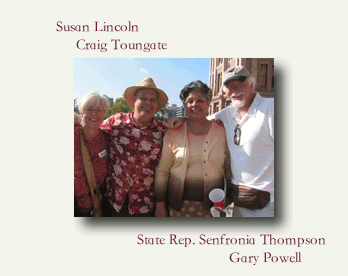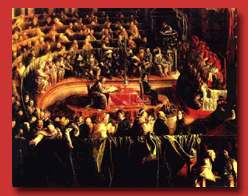by Gary Powell
I have fielded many suggestions for 
songs featuring our great women manumitters.
Susan B. Anthony, Elizabeth Cady Stanton, Sojouner Truth, Harriet Tubman, Ayn Rand, Mother Teresa, and Rosa Parks were all at the top of people’s lists from my informal survey.
The seminal events accredited to great emancipators are seldom born in a single instant. Rosa Parks’ simple expression of truth over power was not a simple knee-jerk reaction. By her own accounts, her awakening of unconscious pain happened in a single instant. However, the crime of treason against humanity she had carried throughout her life. Rosa Parks’ triumphant moment of reason over darkness has earned her place not in the back of the bus but at the front of “Aristotle’s Prayer”.
Today, I performed “The Spirit of Rosa” for the first time with Craig Toungate and Susan Lincoln at the rally on the State of Texas Capitol steps opposing “Proposition 2” which would amend the Texas state constitution eliminating any legal rights for gay marriages.
by Gary Powell
I have fielded many suggestions for 
songs featuring our great women manumitters.
Susan B. Anthony, Elizabeth Cady Stanton, Sojouner Truth, Harriet Tubman, Ayn Rand, Mother Teresa, and Rosa Parks were all at the top of people’s lists from my informal survey.
The seminal events accredited to great emancipators are seldom born in a single instant. Rosa Parks’ simple expression of truth over power was not a simple knee-jerk reaction. By her own accounts, her awakening of unconscious pain happened in a single instant. However, the crime of treason against humanity she had carried throughout her life. Rosa Parks’ triumphant moment of reason over darkness has earned her place not in the back of the bus but at the front of “Aristotle’s Prayer”.
Today, I performed “The Spirit of Rosa” for the first time with Craig Toungate and Susan Lincoln at the rally on the State of Texas Capitol steps opposing “Proposition 2” which would amend the Texas state constitution eliminating any legal rights for gay marriages.
Continue reading “
Celebrate Rosa Parks (1913-2005)
“The Spirit of Rosa” from Aristotle’s Prayer“
by Gary Powell
Scottish economist
Adam Smith authored
The Wealth of Nations published in 1776 in London! That year sound familiar? His book is the blueprint for the free market system which we are struggling to maintain today. Adam Smith’s bust can be found on the historic Scottish penny minted in 1797.
Many contemporary economists believe there is a modern-day “corporate betrayal” of Adam Smith’s economics philosophy. I was struck with the idea that the market economy works only when producers of products have a level playing field free from special interests from any large concentrations of wealth, power and influence and that the fruits of one’s labor should go to the producer. Thusly, I penned the song which commemorates Adam Smith’s penny and the idea that a good portion of that earned penny should belong to the person who produced the work.
In 1751, Smith was appointed Professor of Logic at Glasgow University, transferring in 1752 to the Chair of Moral Philosophy. His lectures covered the field of ethics, rhetoric, jurisprudence and political economy, or “police and revenue”. That said, the philosophy related in the lyrics of the song, “Which Side of the Penny is Yours”, are Adam Smith’s. The “earthy” fashioned lyric is mine and would probably not have been approved knowing Adam Smith’s puritanical leanings. This is clearly my interpretation and no disrepect is meant for Adam Smith’s work which has so influenced and helped liberate the individual human being.
To learn more, please visit The Adam Smith Institute
by Gary Powell
Scottish economist
Adam Smith authored
The Wealth of Nations published in 1776 in London! That year sound familiar? His book is the blueprint for the free market system which we are struggling to maintain today. Adam Smith’s bust can be found on the historic Scottish penny minted in 1797.
Many contemporary economists believe there is a modern-day “corporate betrayal” of Adam Smith’s economics philosophy. I was struck with the idea that the market economy works only when producers of products have a level playing field free from special interests from any large concentrations of wealth, power and influence and that the fruits of one’s labor should go to the producer. Thusly, I penned the song which commemorates Adam Smith’s penny and the idea that a good portion of that earned penny should belong to the person who produced the work.
In 1751, Smith was appointed Professor of Logic at Glasgow University, transferring in 1752 to the Chair of Moral Philosophy. His lectures covered the field of ethics, rhetoric, jurisprudence and political economy, or “police and revenue”. That said, the philosophy related in the lyrics of the song, “Which Side of the Penny is Yours”, are Adam Smith’s. The “earthy” fashioned lyric is mine and would probably not have been approved knowing Adam Smith’s puritanical leanings. This is clearly my interpretation and no disrepect is meant for Adam Smith’s work which has so influenced and helped liberate the individual human being.
To learn more, please visit The Adam Smith Institute
Continue reading “
Adam Smith Authors The Wealth of Nations
“Which Side of the Penny is Yours?” from Aristotle’s Prayer“
by Gary Powell
This painting depicting Galileo’s trial in front of the Catholic church tribunal hung in my brother’s, Joe Powell, house for years. While researching the seminal events where individuals stood up against the institution, this great painting came to mind. When I found the image, I asked my brother, “Is this the painting you had in your house?” He answered, “Yes it is, how about those BOYS IN RED?” The song title was born in that instant and I knew I had another historical piece to interpret musically where power tries to subdue truth.
Perhaps people who focus on their own ethical standards don’t have time to tell the rest of us what’s right.
– Joe M. Powell, Director
The Rice University Building Institute

by Gary Powell
This painting depicting Galileo’s trial in front of the Catholic church tribunal hung in my brother’s, Joe Powell, house for years. While researching the seminal events where individuals stood up against the institution, this great painting came to mind. When I found the image, I asked my brother, “Is this the painting you had in your house?” He answered, “Yes it is, how about those BOYS IN RED?” The song title was born in that instant and I knew I had another historical piece to interpret musically where power tries to subdue truth.
Perhaps people who focus on their own ethical standards don’t have time to tell the rest of us what’s right.
– Joe M. Powell, Director
The Rice University Building Institute
 Continue reading “
Continue reading “
Galileo Goes on Trial 1633
“The Boys in Red” from Aristotle’s Prayer“
by Gary Powell.
 ONE SIMPLE QUESTION to a trusted mentor of all things requiring a deep understanding is what started this performance idea. His name is Ralph Person who is 73 years old with a Doctorate of Theology (DTheol) from the University of Basel in Switzerland. His lifelong relationship with church, philisophy and political history is rich.
ONE SIMPLE QUESTION to a trusted mentor of all things requiring a deep understanding is what started this performance idea. His name is Ralph Person who is 73 years old with a Doctorate of Theology (DTheol) from the University of Basel in Switzerland. His lifelong relationship with church, philisophy and political history is rich.
So, I asked him this question at dinner with no provocation: “What happened in this country (USA) in 1776 that caused such an explosion of human potential and production in every aspect of how humans live, work and prosper together?” Without blinking he said, “You’d have to go back to Aristotle to answer that question!” Ralph expanded the answer by saying, “Aristotle believed that man was uniquely ‘the rational creature’ and that reason was man’s sole source of conceptual knowledge.” Ralph then made a quick leap through the middle ages showing that Thomas Aquinas had rediscovered Aristotle and taught that reason and faith need not conflict. This led to the Renaissance and the Enlightenment.
REASON IS MAN’S BASIC TOOL FOR UNDERSTANDING HIS WORLD AND SURVIVING AND LIVING EFFECTIVELY!
Ralph then went on to explain how Aristotle (384-322 B.C.) was the emancipator of reason. For the first time in history, Aristotle had suggested faith and reason be held apart and that reason is man’s basic tool for understanding his world and surviving and living effectively! Probably not a fabulously popular idea in 350 B.C.!
Ralph then made this remark which astounded me: “Aristotle’s idea, for the most part, didn’t surface again until …….. well, Thomas Jefferson in 1776!” And…there was the answer to my question.
This conversation happened in October, 2004. I was so inspired by the prospect of gaining insight into my own choices and inevitabilities that I thought I could have a two-hour show up by Christmas, 2005. The inevitabilities have stepped forward, but the passion has not flagged. Thanks to Ralph with his wisdom and knowledge, I will add one more voice to the “Choir of Emancipation” in which Ralph has been singing for decades before me.
by Gary Powell.
 ONE SIMPLE QUESTION to a trusted mentor of all things requiring a deep understanding is what started this performance idea. His name is Ralph Person who is 73 years old with a Doctorate of Theology (DTheol) from the University of Basel in Switzerland. His lifelong relationship with church, philisophy and political history is rich.
ONE SIMPLE QUESTION to a trusted mentor of all things requiring a deep understanding is what started this performance idea. His name is Ralph Person who is 73 years old with a Doctorate of Theology (DTheol) from the University of Basel in Switzerland. His lifelong relationship with church, philisophy and political history is rich.
So, I asked him this question at dinner with no provocation: “What happened in this country (USA) in 1776 that caused such an explosion of human potential and production in every aspect of how humans live, work and prosper together?” Without blinking he said, “You’d have to go back to Aristotle to answer that question!” Ralph expanded the answer by saying, “Aristotle believed that man was uniquely ‘the rational creature’ and that reason was man’s sole source of conceptual knowledge.” Ralph then made a quick leap through the middle ages showing that Thomas Aquinas had rediscovered Aristotle and taught that reason and faith need not conflict. This led to the Renaissance and the Enlightenment.
REASON IS MAN’S BASIC TOOL FOR UNDERSTANDING HIS WORLD AND SURVIVING AND LIVING EFFECTIVELY!
Ralph then went on to explain how Aristotle (384-322 B.C.) was the emancipator of reason. For the first time in history, Aristotle had suggested faith and reason be held apart and that reason is man’s basic tool for understanding his world and surviving and living effectively! Probably not a fabulously popular idea in 350 B.C.!
Ralph then made this remark which astounded me: “Aristotle’s idea, for the most part, didn’t surface again until …….. well, Thomas Jefferson in 1776!” And…there was the answer to my question.
This conversation happened in October, 2004. I was so inspired by the prospect of gaining insight into my own choices and inevitabilities that I thought I could have a two-hour show up by Christmas, 2005. The inevitabilities have stepped forward, but the passion has not flagged. Thanks to Ralph with his wisdom and knowledge, I will add one more voice to the “Choir of Emancipation” in which Ralph has been singing for decades before me.
This is composer, Gary Powell’s 2nd one-man show under development right now. Gary Powell’s productions have sold over 30 million albums in 47 countries. He has taught at the University of Texas at Austin and continues to lecture and coach. Watch how the development of this performance art is conceived and produced. The first show presented in 1997 is now entitled “Maybe I’m It, Maybe I’m Not”.




